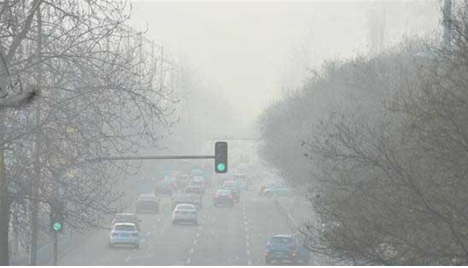Pollution keeps a nation on alert
 0 Comment(s)
0 Comment(s) Print
Print E-mail Shanghai Daily, January 5, 2017
E-mail Shanghai Daily, January 5, 2017
Alerts for air pollution and fog in north, east and central China were renewed yesterday with heavy smog set to persist until at least this morning.
 |
|
Alerts for air pollution and fog in north, east and central China were renewed yesterday with heavy smog set to persist until at least this morning. |
The National Meteorological Center said thick fog would reduce visibility to less than 200 meters in areas that included the cities of Beijing and Tianjin, and the provinces of Hebei, Henan, Shandong, Anhui, Jiangsu and Shanxi. In extreme cases, it could fall below 50 meters.
Beijing extended its orange alert for heavy air pollution, with smog expected to hang around until the weekend, environmental authorities said. The alert was due to be lifted last night, but the capital's environmental protection bureau said air in most of the Beijing-Tianjin-Hebei region remained severely polluted.
Data from Beijing's environmental monitoring center showed that the density of PM2.5, the particulate matter associated with hazardous smog, stood at 391 micrograms per cubic meter at noon.
Air quality is set to improve on Sunday night with the arrival of a strong cold front, but some cities in the region may still see moderate to heavy pollution that day.
From Monday to Wednesday next week, air in the region will be "good" or "slightly polluted," but it is forecast to worsen again next Thursday, except in parts of Shandong, Henan and Shanxi.
Nearly 62 percent of cities monitored by the Ministry of Environmental Protection suffered from air pollution yesterday, providing fresh evidence of the environmental challenges facing the country.
Of 338 cities under real-time monitoring by the ministry, 7.1 percent, including Tianjin, were hit by serious air pollution, with air quality index readings exceeding 300.
Another 24.9 percent of the cities, including Beijing, saw heavily polluted air, with AQI readings between 201 and 300, the ministry said.
In addition, the air in 15.1 percent of the cities, including Hangzhou in east China's Zhejiang Province, was moderately polluted, with AQI readings between 151 and 200.
The data also revealed that 14.8 percent of the cities, including Changchun in the northeast's Jilin Province, had slightly polluted air, with readings between 101 and 150.
The fog and smog continued to affect traffic across north and central regions yesterday, grounding flights and bringing traffic to a standstill.
Several expressways in Beijing — including sections linking the capital with Harbin in the northeast, Shanghai in the east, and neighboring Tianjin — were closed from early morning to 3pm. Beijing Nanyuan Airport had canceled 46 flights as of 11:30am.
In central China's Henan Province, low visibility led to restrictions on 12 expressways. The province also ordered kindergartens and primary schools to close.
The neighboring province of Shandong upgraded its alert for heavy fog from orange to red and, as of noon, more than 155 flights from its capital of Jinan had been delayed, canceled or diverted.
More than 2,000 tourists had been stranded on a cruise ship for two extra days near Tianjin, as smog prevented the ship from docking, Beijing Evening News reported.
Many cities have suffered from frequent winter smog in recent years, triggering widespread public concern. China has stepped up efforts to cut outdated production and has sent inspection teams to supervise environmental measures.






Go to Forum >>0 Comment(s)